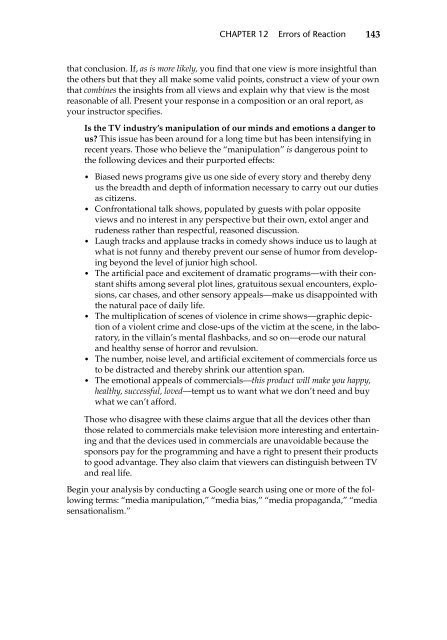Beyond Feelings
Beyond Feelings
Beyond Feelings
You also want an ePaper? Increase the reach of your titles
YUMPU automatically turns print PDFs into web optimized ePapers that Google loves.
CHAPTER 12 Errors of Reaction<br />
143<br />
that conclusion. If, as is more likely, you find that one view is more insightful than<br />
the others but that they all make some valid points, construct a view of your own<br />
that combines the insights from all views and explain why that view is the most<br />
reasonable of all. Present your response in a composition or an oral report, as<br />
your instructor specifies.<br />
Is the TV industry’s manipulation of our minds and emotions a danger to<br />
us? This issue has been around for a long time but has been intensifying in<br />
recent years. Those who believe the “manipulation” is dangerous point to<br />
the following devices and their purported effects:<br />
• Biased news programs give us one side of every story and thereby deny<br />
us the breadth and depth of information necessary to carry out our duties<br />
as citizens.<br />
• Confrontational talk shows, populated by guests with polar opposite<br />
views and no interest in any perspective but their own, extol anger and<br />
rudeness rather than respectful, reasoned discussion.<br />
• Laugh tracks and applause tracks in comedy shows induce us to laugh at<br />
what is not funny and thereby prevent our sense of humor from developing<br />
beyond the level of junior high school.<br />
• The artificial pace and excitement of dramatic programs—with their constant<br />
shifts among several plot lines, gratuitous sexual encounters, explosions,<br />
car chases, and other sensory appeals—make us disappointed with<br />
the natural pace of daily life.<br />
• The multiplication of scenes of violence in crime shows—graphic depiction<br />
of a violent crime and close-ups of the victim at the scene, in the laboratory,<br />
in the villain’s mental flashbacks, and so on—erode our natural<br />
and healthy sense of horror and revulsion.<br />
• The number, noise level, and artificial excitement of commercials force us<br />
to be distracted and thereby shrink our attention span.<br />
• The emotional appeals of commercials—this product will make you happy,<br />
healthy, successful, loved—tempt us to want what we don’t need and buy<br />
what we can’t afford.<br />
Those who disagree with these claims argue that all the devices other than<br />
those related to commercials make television more interesting and entertaining<br />
and that the devices used in commercials are unavoidable because the<br />
sponsors pay for the programming and have a right to present their products<br />
to good advantage. They also claim that viewers can distinguish between TV<br />
and real life.<br />
Begin your analysis by conducting a Google search using one or more of the following<br />
terms: “media manipulation,” “media bias,” “media propaganda,” “media<br />
sensationalism.”


